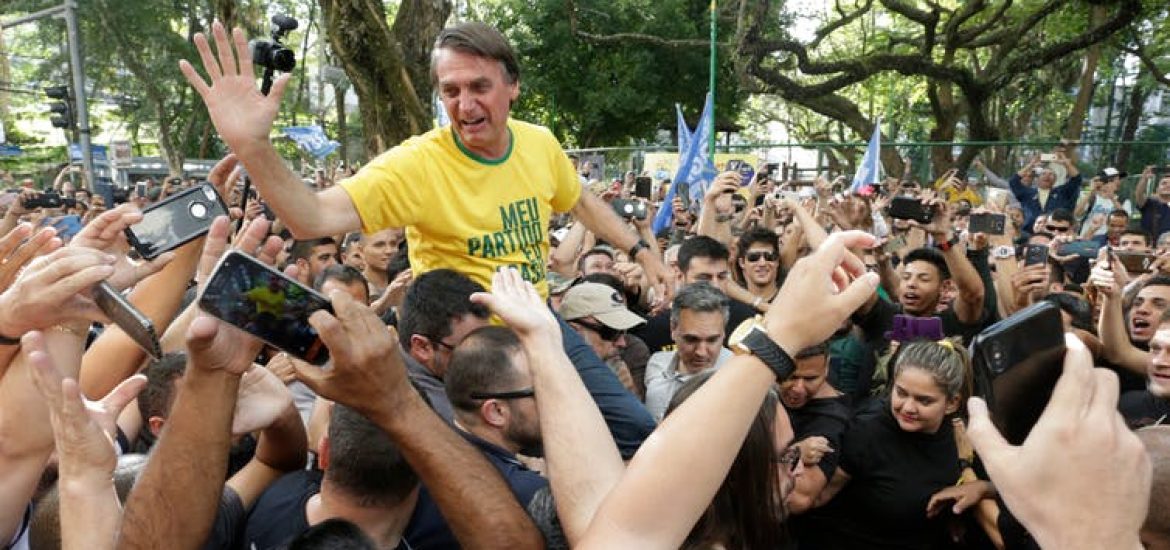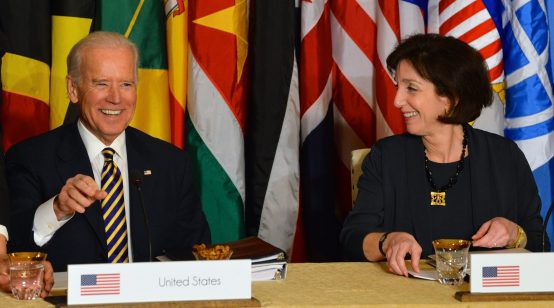
Photo: Antonio Scorza / Shutterstock
Ed Atkins, University of Bristol
It is perhaps a cruel irony that, on the same day the Intergovernmental Panel on Climate Change released a landmark call for urgent action, Jair Bolsonaro surged to victory in the first round of Brazil’s presidential elections. Although the leader of the far-right Partido Social Liberal did not achieve the 50% of the popular vote required to win outright, and will now have a run-off against Fernando Haddad of the Partido dos Trabalhadores (Workers’ Party), his rise has posed some painful and divisive questions both within Brazil and beyond.
Bolsonaro has openly spoken of the need for a military coup and has a record of racist, misogynistic and homophobic views. He is often compared to Donald Trump in the US, and such parallels can also be seen in the protectionist economic doctrine Bolsonaro has adopted in this election, for instance a promise to end the banana trade with Ecuador to protect Brazilian producers.
Read more:
Brazil: can its poorest region call a halt to Jair Bolsonaro’s dangerous politics?
The electoral success of this divisive figure leaves Brazil at a crucial turning point. There have already been numerous analyses of what this could mean for Brazilian politics – but what could it mean for the environment?
Tchau, Paris?
Despite Bolsonaro’s campaign being based on personality as much as policy, it is possible to find some relevant promises – and they aren’t good news.
For a start, Bolsonaro has previously said that, if elected, he would withdraw Brazil from the 2015 Paris Agreement on climate change, arguing that global warming is nothing more than “greenhouse fables”. Ultimately, his power to reverse the decision is limited, however. This is because the Paris deal was approved via the Brazilian congress, which is currently divided between 30 parties, and Bolsonaro would face the tricky task of convincing a broad church of conservatives.

Harvepino/Shutterstock
Although Bolsonaro may be unable to withdraw from the Paris framework, his election would still be a direct threat to the regime of environmental protection in Brazil.
Ruralistas for Bolsonaro?
Bolsonaro’s rise is a symptom of a wider political shift that has seen an alignment between the environmental views of the far right and those of powerful political factions in Brazil.
Although never directly linked, Bolsonaro’s environmental policies would likely be welcomed by the so-called “ruralistas” – a powerful alliance of agribusiness and big landowners within the country’s Senate and Chamber of Deputies. The ruralista faction previously supported the outgoing president Michel Temer and is infamous for its regressive environmental agenda, which seeks to further deforest the Amazon to make way for cattle farms, soy plantations and the mining industry.
Bolsonaro has called for the closure of both Brazil’s environment agency (IBAMA), which monitors deforestation and environmental degradation, and its Chico Mendes Institute which issues fines to negligent parties. This would eliminate any form of oversight of actions that lead to deforestation.
Bolsonaro has also threatened to do away with the legislative protections afforded to environmental reserves and indigenous communities. He has previously argued that what he describes as an “indigenous land demarcation industry” must be restricted and reversed, allowing for farms and industry to encroach into previously protected lands.
By removing these protective organs from the equation, the message that Bolsonaro is sending is clear: vast swathes of Brazil’s biologically diverse and ecologically important landscape will be opened up for development and extraction. With the Brazilian soy industry profiting from the current trade war between the US and China, it is highly likely that promises of this potential expansion would be well received.
In the run up to this election, figures were released which showed the rate of deforestation in the Brazilian Amazon is continuing to climb. In August 2018, 545km² of forest were cleared – three times more than the area deforested the previous August. The world’s largest rainforest is integral to climate change mitigation, so cutting back on deforestation is an urgent global issue. Brazil, however, is heading in the opposite direction.
Any collective relief at the far right not winning the first round outright may be short-lived. While the previous government of Temer rolled back environmental protections, a Bolsonaro government will likely adopt a brazen anti-environmental strategy. The second round of the election is soon to take place. In light of the IPCC’s recent report, there is more riding on it than ever.![]()
Ed Atkins, Teaching Fellow, School of Geographical Sciences, University of Bristol
This article is republished from The Conversation under a Creative Commons license. Read the original article.





